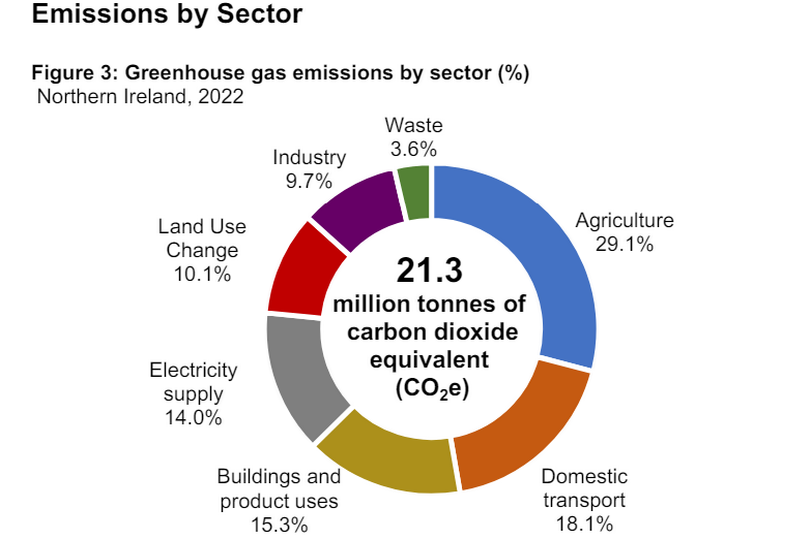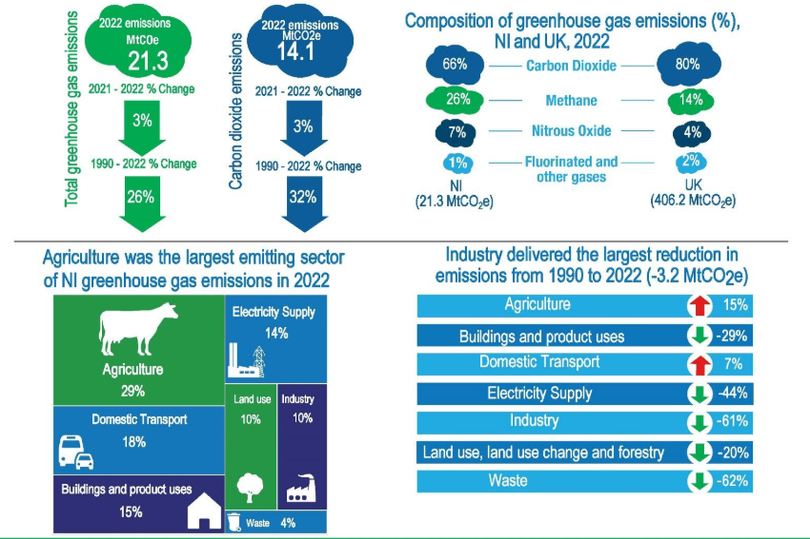Northern Ireland 'bottom of the class' on greenhouse gas cuts, says Queens professor

Northern Ireland has been branded “bottom of the class” following the latest official greenhouse gas emissions report. Queen’s University Professor John Barry says the reduction of just 3% in harmful emissions from 2021-2022 is an “epic fail” when we “need annual reductions of around 10% a year” to achieve Net Zero.
Agriculture and domestic transport are behind almost half the harmful greenhouses gases Northern Ireland pumped out in 2022.
Across the year, our lifestyles and resource use created a total of 21.3 million tonnes of carbon dioxide equivalent (MtCO2e).
READ MORE: Court of Appeal rules Edwin Poots' gas caverns decision was 'irrational'
READ MORE: Belfast councillor tells us why the council should move to plant-based catering
That marked a drop of 3% compared to 2021 with every sector - except domestic transport like cars, vans and lorries - reducing their emissions. But Northern Ireland still lags far behind other parts of the UK in terms of greenhouse gas reductions with our reliance on road transport
According to the latest Department for Agriculture, Environment and Rural Affairs emissions report we delivered a cut of just 26.4% from 1990-2022 while England and Scotland more than halved their emissions and Wales cut theirs by 36.4%.
In that time our agricultural emissions have risen 15% and domestic transport 7%, while sectors like industry, land use and forestry, waste, buildings, product uses and electricity have fallen substantially.
NI is also responsible for 5.3% of UK emissions despite holding just 2.8% of the population.
The Department for Agriculture, Environment and Rural Affairs last asked the public what they thought about climate change in 2012.
But “with record breaking temperatures... the regular occurrence of floods, extreme weather events as well as greater awareness of climate change amongst the public - it’s high time, if not high tide, for the department to do a more up to date survey” of perceptions on the issue says Prof Barry.

He added: “A 3% reduction when to achieve Net Zero and to keep pace with what the climate clearly indicates, we need annual reductions of around 10% a year.
“Agriculture’s share of NI emissions has increased – up from 28% in 2022 to 29.1%... so [we’re] going completely in the wrong direction which is very worrying given this is sector that needs to most ‘bend the emissions curve down’.
“If we examine agricultural emissions more closely, we see the reason for that increase in livestock, as soil and agricultural combustion have slightly declined from 2021-2022.
“Given the unsustainable and pollution impacts of the NI beef, pig and dairy herd being the major cause of fish kills and the ecological disaster in Lough Neagh, these figures are further evidence, from a climate crisis point of view, of the need for a ‘just transition’ away from this heavily livestock based agricultural system.”
On rising transport emissions, he added: “We need more active travel and public transportation uptake as well as more people choosing EVs to reverse this trend”.
But he also warned the report does not include ‘scope 3 emissions’ which are the carbon footprint of goods made elsewhere and imported to NI and said “if these consumption based emissions were included our emissions footprint would be much much bigger”.
Declan Allison from Friends of the Earth NI says that while “it’s good to see Northern Ireland’s greenhouse gas emissions are continuing to fall... unfortunately they aren’t falling fast enough”.
He added: “The climate crisis is the greatest threat facing this, or any other, generation. Northern Ireland’s response to this crisis is simply not good enough.
“Agricultural and transport emissions are rising, and major fossil fuel infrastructure is still being planned.
“The Environment Minister must publish the Climate Action Plans that are required by law as soon as possible.
“These plans must set a clear and just transition to a zero-carbon future. Northern Ireland should be a climate laggard no longer.”
Claire Pollock, Head of Sustrans in Northern Ireland, said: "The lack of a decrease in domestic transport emissions is a real concern. As the second-largest cause of carbon emissions in Northern Ireland, we all need to consider our choice of transport as a matter of urgency and make the effort to adopt active travel, such as walking, wheeling and cycling, or public transport, for as many journeys as possible.
"The Northern Ireland Climate Change Act makes it a legal requirement for 10% of the transport budget to be spent on active travel, however, this has yet to be delivered. We must ensure that this statutory obligation is delivered as soon as possible."
DAERA and DfI have been contacted for comment.
For all the latest news, visit the Belfast Live homepage here and sign up to our daily newsletter here.

 Yahoo News
Yahoo News 
